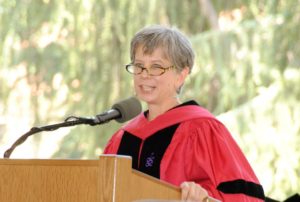Cause Lawyering Is Cause Celebre at 2015 SLS Commencement
On a bright, searingly hot morning on June 13th, 192 Stanford JD and 75 advanced degree students filed into the shade of an at-capacity canopy at Canfield Courtyard, joining 1,500 celebrants and dozens of law school faculty and staff. Together, they witnessed not only the annual commencement at the Law School in all its pageantry, but also the first time the John Bingham Hurlbut Award for Excellence in Teaching has been conferred upon an SLS professor engaged exclusively in clinical education teaching. This honoree was none other than the Mills Legal Clinic’s associate dean of clinical education, Juliet Brodie.

A legal aid lawyer and teacher of Stanford Law School’s Community Law Clinic, Prof. Brodie prefaced her address,
“What would you expect a legal aid lawyer to tell you? You would expect her to remind you of your duty to serve the poor. You would expect her to summon you to honor the highest calling of our profession, which, to my mind, embodies the highest calling of our democracy, and perhaps even of our humanity: to serve the least among us, and to measure our professional success not by what we earn or how important we are, but by how much good we have done on their behalf. . . .”
She then, unsurprisingly, encouraged the graduates to endeavor toward the cause of social justice and service to the poor and underrepresented, despite the “bad news” of recent months and structural inequities within our legal justice system. Prof. Brodie spoke on the realities of dim access to justice for the impoverished:
“In the absence of a right to counsel, poor people rely on legal aid or voluntary pro bono services. The U.S. has one legal aid lawyer for every 6,400 low-income people, compared to one private lawyer for every 429 people who are not poor. State court data tell us that at least 80% of poor people’s civil legal needs go unmet . . . because they can’t afford private lawyers, and there aren’t enough pro bono or legal aid lawyers to represent them.”
However daunting this backdrop before which new graduates now find themselves, Prof. Brodie reminded the graduating audience of the counterbalancing “good news”:
“ . . . [Y]ou are joining the profession that has, however slowly, moved forward the rights and interests of the have-nots in powerful ways. The law gave us Gideon v. Wainwright, which guaranteed to every person charged with a crime the lawyer I mentioned a minute ago. And gave us Brown v. Board, which recognized that de jure segregation denies citizens equal protection of the law. Moreover, you are joining the profession that, even appreciating the diversity of its membership, asks each of us to serve the poor and to recognize that in a constitutional democracy, a legal system that is available only to those of means, is not a legal system worth defending.”
Professor Brodie stressed the importance of measuring one’s professional success not by earnings, but by service to those who need it most. Central to this message, she quoted a phrase from ancient teachings of Judaism’s Mishnah, which is also emblazoned on the backs of Community Law Clinic t-shirts, “You are not required to complete the task of repairing the world. But neither are you free to ignore it.”
All in the Mills Legal Clinic heartily congratulate Juliet Brodie for receiving this year’s John Bingham Hurlbut Award!
Established in 1974 by the Stanford Law Students Association, the Hurlbut award honors those professors (beginning with its namesake) who have brought particular distinction to the art of teaching. Juliet Brodie’s name will be added to the list of previous honorees, including most recently: George Fisher, Pam Karlan, Joseph Grundfest, Robert Weisberg, Paul Goldstein, Norm Spaulding, Barbara Fried, Robert Daines, and Barbara Babcock.
